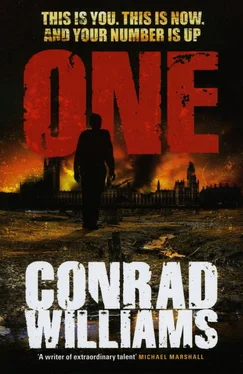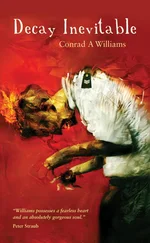‘Keep your wits about you, Loke,’ he said. ‘If someone got away, we might walk right past them.’
Loke grunted in return, and Jane knew he had instantly dismissed the idea, but Jane clung to the story of the woman who had fled from the Skinners encamped at Wembley stadium. She might have died later, her brain stalled with whatever barbarity she had been put through, but she got away. She got away.
Jane found the going became easier after a while as his muscles warmed up and the stiff feeling in his wounded leg was worked out. He had kept the cuts scrupulously clean and sought advice from the medics. They’d pulled some classic faces when he’d showed them his thigh, but they were satisfied it was not infected and gave him pills to cope with the pain that those wounds and his burnt arm were feeding him.
The peninsula was broader than he’d thought. He had never been out this way before, although he had read about Derek Jarman’s cottage and its weird garden of stones and iron and claws. The skeletons of fishing boats lay in the shingle along with that strange machinery, like unearthed fossils from an alien age. Occasionally they would trip over some rusted girder or spar, or see the shape of a cog half-submerged in the beach. Jane wondered how deep it reached and whether it was really discarded, or if it was part of some arcane Heath-Robinson contraption that served the coastline in some secret way.
The mutter of the camp faded behind them and dead silence fell. Jane felt much as he used to in the diving bell travelling between the Ceto and the seabed. A time when you collected your thoughts and focused yourself on the job. All the banter of the DSV was behind them. The hours of noisy respiration and the headache of high-pitched voices, the roar of the blowtorch was to come. It was the eye of the storm. And it had always been the time that scared him more than any other. He couldn’t help but think, while the various aspects of the job impinged and the gauges were read and adjusted, that this journey would be his last. Once he was in his gear and tramping towards the coalface he was fine. It was the pause to take breath beforehand, the catalogue of things that might go wrong that caused his will to falter.
So it was now. He thought that despite all his best intentions, if Loke had not been walking alongside him he would not have been able to do this. The pain in his arm was too great. He was so tired that he thought he might begin to crumble. He feared that he would find Becky dead, and that would be the final black underscore to his chances of happiness, or hope.
It took some time to work their way around the nuclear reactors – Jane was expecting to hear some kind of hum, but all was silent – because of a number of downed pylons and security fences obstructing their path. Once on the other side they made better time. The sand was mired with deep pits and runnels; occasionally they stumbled upon items of clothing, or single shoes. It looked like the haphazard disrobing of suicides. The red line leapt in streaks of orange as they got closer.
‘What’s the fire for?’ Loke asked.
Jane shrugged. ‘I don’t know. Maybe they’re cooking. Or it’s a sacrifice or something.’
‘Nice. Wish I hadn’t asked.’
Jane clenched his jaw; another tooth popped loose. He spat it out. Dull fire was spreading deep in the angles of his face. Bone cancer, he thought.
‘Loke, are your teeth all right?’
He sensed the other man turning to him in the dark. ‘They’re OK. I mean, they could be better. I haven’t been to a dentist in ten years. But they’re not giving me any gyp.’
Jane fell silent. He must be dying. Much of the time, talking to other survivors, he had surreptitiously checked out their mouths, and, other than the occasional abscess or absence, most people’s teeth had been intact. He had noticed the way people snatched glances at his own ruined gums and then looked away, like rubberneckers at a fatal crash who have seen more than they bargained for. The taste of blood was always in the back of his throat, the rust smell of it trapped in the mask all hours. He would lie awake at night, prodding and palpating his flesh, feeling for fibrous lumps, or for any too soft, bruised parts of him that suggested decay.
He ran his tongue delicately over his remaining teeth. How many? Ten? Twelve? All of them waggled in their sockets at the faintest touch. He shuddered with disgust and tried to push the thought of what it meant from his mind; a job needed doing.
Loke said, ‘Oh no.’
The beach fell away. It was blasted open, as though it had been hit by some immense bombshell or meteorite. They crawled on their bellies to the lip of the crater and peered in.
You believe, once you’ve grown up, that you’re hardened to the worst things the planet and its people can throw at you. You form a skin around you so tough it’s like horn. You watch the footage of Katrina, of the Boxing Day tsunami, of 9/11 and you struggle to cope with it, to understand it; you find it hard to continue. But you do. You go on. You layer the pain around you and feel it become absorbed. Next time it doesn’t hurt quite so much. You kind of begin to expect bad things.
What’s the worst thing you’ve ever seen, Dad?
He thought of the abattoir and the mirror carp. But it was nothing. It was a confection. It was almost cosy.
Never mind, Stanley. How about you? What’s…
But he couldn’t finish the question. His boy had seen the worst thing in the world, and Jane had not been there to hold him while it blazed all around.
‘Loke,’ he whispered. He could see his companion to his left, lying on his back staring up at the sky. He seemed not to be breathing. For a second Jane thought he might have committed suicide. The lure of it hung thickly in the air like the remembered scent of summer flowers. ‘Loke?’
‘OK,’ Loke said. ‘I’m all right.’
Jane couldn’t ask him about what was down there. To mention it was to confirm it and Jane had to cling on to the possibility that it was all a mirage, something dreamed up by his poisoned subconscious.
‘I need to find Becky,’ he said. The simplicity of it bolstered him. Everything else was scenery.
‘What do you want me to do?’ Loke asked.
‘Just keep an eye on me,’ Jane said. ‘If it looks as though I’m getting into trouble, cause a distraction. Get them to come after you. And get the fuck away.’
‘I love those no-risk strategies,’ Loke said.
Jane took a deep breath, shut his eyes. Stanley was there. Nothing that happened to Jane could equal what his boy must have gone through. What he had seen beyond the crater’s lip replayed itself against the black screen of his closed eyelids. He rolled over the edge and into the abyss. What’s the worst thing you ever saw, Daddy?
Oh, Stanley. Oh my God.
There were no Skinners to be seen. He walked among the ribcage prisons, wondering if one of the malformed babies screaming within them belonged to Becky. It didn’t seem to matter that she was less than two months pregnant. Logic had no place here. He didn’t want to see, but he had to watch where he was putting his feet; the babies were packed together so tightly. Some of them were dead. Others had stopped crying or had never started, and looked out through the gaps in the bones with black eyes, open faces. Some of them were bloated to the point of featurelessness, others bore spare limbs, vestigial or fully formed. The pit stank of meconium and vomit and the ever-present civet-like musk of Skinner. It was like some monstrous collection of lobster pots.
Up ahead was an enormous linear bonfire, stretching a hundred yards or so between the headland and the water, the source of the quaking red light. The ribcages stretched as far as he could see. There must be fifteen hundred, maybe as many as two thousand, he thought. He felt the centre of himself deliquesce. The fire picked out the half-submerged wreck of a ship in the water, its skid fin peppered with rust-holes that gleamed like eyes. He thought he could hear the waves beating against the hull, but knew it was only the tumult of his own heart. To his right, where the beach rose up to meet the low wall of a promenade, he could see movement. He crouched, grimacing as a hand put out to balance him cracked a rib and brought a fresh sustained volley of protests from the blighted thing trapped within. He saw Skinners, fully three dozen of them, churning through the sand towards the upper ranks of the cages. The way they behaved itched at Jane. Something was not right in their movements. There was a desperation there, a motivation other than hunger.
Читать дальше












